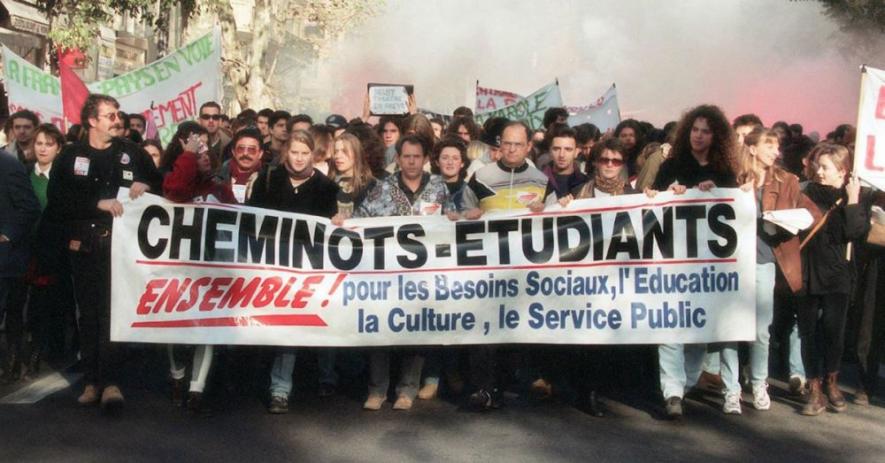Will France Be Celebrating 50th Anniversary of the May 1968 By Replaying History?

Image Courtesy: In Defence of Marxism
Tens of thousands participated in protests in France on April 19. The protests were a part of the rolling strikes by railway workers that will be held for two consecutive days out of every five, until June 28. While the protests were peaceful for the most part, occasional clashes between police and Left-wing groups have been reported.
In Paris city alone, the police estimated that 11,500 participated in the protests, while a count by a crowd consultancy suggests participation of 15,000 people. According to CGT, the Left-wing union which was the main organiser of the strikes, the crowd pouring on the streets was 50,000-strong.
Almost 20 per cent of the SNFC staff stopped the work during the strike, which left only one of the three high-speed TGV trains operating. While the protests reportedly caused significant disruptions, the percentage of workers participating in the strikes as well as the percentage of trains that were halted were significantly lower than it was during the first wave of the strikes that started about three weeks ago.
The strikes have been called against the Macron government’s proposed reforms to SNFC (France’s state-owned national railways), which seeks to change the legal status of SNFC from a ‘public company' to a 'publicly financed corporation'. Many believe, in spite of the government's denial, is the first step towards selling out the national railways to private corporations.
The reforms, if implemented, will also disenfranchise the new recruits to the railways, of the special status the railway workers had won. This special status of the contract, under which almost 90 per cent of the railway workers are hired, provides them a high degree of job security by prohibiting the employer from laying off workers on the grounds that the employer finds it profitable to do so.
The special status also allows those employed under this contract to retire at the age between 50 and 55 years. At the time this special status was granted in the early 20th century, it was hardly a concession made to the workers, as the average lifespan of most of them who enjoyed this privilege fell short of the retirement age, as historian Georges Ribeill has pointed out .
However, the fact that the railway workers have continued to hold on to this privilege to date has provoked bitterness among some of other workers who do not have the same, which might partly explain why the public support for the railway strikes, in spite of registering an increase in 4 per cent according to polls early this month, still remains at 46 per cent.
President Macron’s government has been attempting to paint that the railway employees as privileged workers, who are holding on to their unjustified privileges at the cost of larger public interest. The public, however, seems not to have failed to notice that since assuming presidency, the former Rothschild banker has passed a series of amendments targeting not only the railway workers but also students, pensioners, civil servants and other workers in both public and private sectors.
Displaying dissent against the government’s plan to introduce a set of admission criteria, which will end the guarantee of university admissions to all students who have a high school diploma, students have shut down four universities in France, and have taken active part in the protests.
The protests on March 22 that rocked 150 towns across France saw participation of large numbers of pensioners, alongside railway workers and students. After reducing the wealth tax and capital gains tax for the benefit of the richer segments of the French society, the government raised the tax on pensioners by 1.7 per cent.
This measure, which will affect 60 per cent of the 15 million pensioners in the country, will require them to pay an extra $31 per month, which, Michel Salingue from the General Federation of Public Pensioners has warned, will be an enormous burden on them. These pensioners receive an average monthly pay of only $1600, at a time when reduction in welfare and hike in diesel prices have already been eroding their purchasing power.
Also participating in the protests were civil servants, angered by the wage-stagnation and the proposed plans to cut 120,000 public sector jobs by 2022. The amendments to French labour laws has had an adverse effect on the job-security of private sector employees as well.
The French labour laws previously allowed workers to claim damages in the special courts overseeing employment-contract disputes, if they were laid off by an employee failing to show "cause" for job-termination. As a part of the far-reaching labour law amendments, a ceiling of three months’ salary has been imposed on the amount of damages that an unjustly terminated worker could thus claim from his employee.
“Whereas bosses may have previously hesitated over certain job cuts for fear of unfavorable court rulings, now they can rest assured that the firings will not cost more than several months of extra pay,” Cole Stangler had warned last year.
While the French laws allowed for employers to lay-off workers by showing that their enterprise is under financial stress, the multinational corporations were required to demonstrate that the company’s finances were stressed globally, and not simply in France. Proposed reforms, Stangler had warned, “(W)ould limit that threshold to France alone. In other words, a major manufacturer doing business in a dozen different countries will be given legal footing to cry poverty in France just as it builds new plants in, say, Poland or Turkey.”
Following these reforms, Jacobin reported , the makers of Peugeot and Citroen cars, Groupe PSA, which saw historically high profit margin and a record sale in 2017 for the fourth consecutive year, announced its plans to lay off 2,200 jobs in France early this year, after expanding the company by acquiring Opel from General Motors. Another announcement of cutting 2,400 jobs was made by the French multinational retailer, Carrefour S.A.
“What we need to avoid is that all the grievances fuse together, as was the case in 1995,” a government official reportedly said late last month, when the protests against anti-labour reforms were gaining momentum. In 1995, the country saw the largest mobilisation after 1968, with a series of general strikes paralysing the country till the government withdrew the anti-labour reforms it had proposed.
But by mounting such a multi-pronged attack on all sections of the working class across different occupations, the Macron government might be risking just that – a fusing together of grievances. Or a ‘convergence of movements’, as the Left-wing union CGT has called for, urging on all sections of the populations affected by Macron’s reforms to unite together on the streets of France in a common protest against the government.
Will France be celebrating 50th anniversary of the May 1968 movement next month by replaying history? Many on the Left hope that the answer turns out to be affirmative.
Get the latest reports & analysis with people's perspective on Protests, movements & deep analytical videos, discussions of the current affairs in your Telegram app. Subscribe to NewsClick's Telegram channel & get Real-Time updates on stories, as they get published on our website.
























